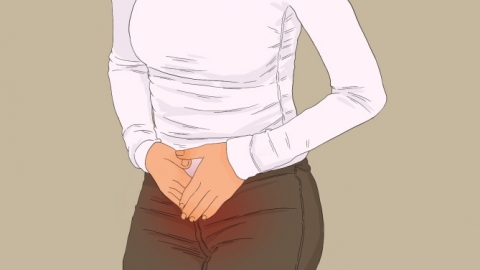What to do about clitoral itching
Generally, clitoral itching may be caused by improper local hygiene, clothing friction irritation, vulvar eczema, fungal vulvitis, trichomonas vulvitis, and other factors. It is recommended to seek timely medical attention, identify the cause, and improve the condition under a doctor's guidance through general treatments, medications, etc. A detailed analysis is as follows:

1. Improper Local Hygiene: Inadequate cleaning can lead to accumulation of dirt and sweat that irritate the clitoris, or excessive cleaning with irritating solutions may damage the local mucous membrane, causing itching. Wash the vulva daily with warm water, avoid using soap, shower gel, or other cleansing products. Choose loose, breathable cotton underwear, change daily, and wash used underwear with boiling water before drying in sunlight.
2. Clothing Friction Irritation: Prolonged wearing of tight synthetic underwear or pants can cause repeated friction against the clitoral skin and mucous membranes, leading to localized sensitivity and itching. Immediately switch to loose cotton underwear, avoid wearing tight jeans, reduce friction on the clitoral area, and take movement breaks every hour of sitting to avoid prolonged sitting which may worsen irritation.
3. Vulvar Eczema: The vulvar skin may develop eczema due to dampness, allergies, and other factors, manifesting as itching of the clitoris and surrounding skin, red patches, or pimples. Follow medical advice to apply medications such as desonide cream, hydrocortisone cream, mometasone furoate gel, etc., to the affected area.
4. Fungal Vulvitis: Inflammation caused by Candida infection results in significant itching of the clitoris and vulva, possibly accompanied by white, curd-like discharge. Follow medical advice to apply medications such as clotrimazole cream, miconazole nitrate cream, nystatin vaginal ointment, etc., to the clitoris and vulva.
5. Trichomonas Vulvitis: Caused by infection with Trichomonas vaginalis, this condition causes clitoral itching accompanied by yellow-green, frothy discharge with an odor. Follow medical advice to apply topical medications such as metronidazole gel, tinidazole gel, ornidazole vaginal suppositories, etc., and if necessary, combine with oral metronidazole tablets.
In daily life, avoid consuming spicy and irritating foods to reduce indirect skin irritation. Keep bath water temperature around 37°C, avoid hot water washing of the vulva, maintain regular sleep patterns, enhance physical immunity, and help relieve itching symptoms and prevent recurrence.




